Plant root breakthrough leads to Science paper – Bipin Pandey and Rahul Bhosale tell us how it happened!
January 22, 2021
Dr. Bipin Kumar Pandey (above) is a Research Fellow in the School of Biosciences at the University of Nottingham. He received a 12-month PhD+ award from the Future Food Beacon in April 2018. Dr. Rahul Bhosale is a Nottingham Research Fellow in Phenomics and Functional Genomics at the Future Food Beacon, University of Nottingham. He …
Bees and neonicotinoids – what does the science say? – by Prof. David E. Salt
January 13, 2021
Photo by Roberto Patti on Unsplash DEFRA has announced that, for the 2021 growing season, thiamethoxam will be allowed to treat sugar beet seeds, prior to planting. This is a temporary authorisation for 2021 only but may be extended for the 2022 & 2023 growing seasons. This has understandably caused controversy and elicited passionate reactions. …
Improving Brassica rapa for better nutrition – An interview with Dr Guillermina Mendiondo
December 7, 2020
Dr Guillermina Mendiondo is an Assistant Professor in Translational Crop Science at The University of Nottingham. She works on different plant species as part of her work on crop molecular genetics within the Future Food Beacon. The origins of the project In 2018, Dr Mendiondo travelled to South Africa and visited farmers in KwaZulu-Natal as …
Chasing auxin through the plant – international collaboration leads to Nature paper – by Anthony Bishopp
November 23, 2020
Photo (right) by Rita Astrovich on Unsplash Anthony Bishopp is a Royal Society University Research Fellow, Faculty of Science, University of Nottingham When Charles Darwin noticed that plants bend towards light, he performed a series of experiments showing that a mobile signal produced in the growing tip caused the plants to bend at the base. 160 years …
The real arsenate reductase stands up! – Is this the end of the HAC story?
November 19, 2020
Warning: this blog contains some hardcore plant science. Look away now if this is a bit much! This blog celebrates the publication in the Journal of Experimental Botany of a new paper about arsenate reductase in plants. Dr. Sina Fischer of the Future Food Beacon is the first author on the study and performed much of the work, assisted by a number of co-authors. including Dr Paulina Flis who leads Prof. Salt’s Ionomics Facility. Prof. David E. …
Palaeobenchmarking Resilient Agricultural Systems (PalaeoRAS) – by Prof. Matt Jones
October 12, 2020
Professor Matthew Jones heads up the Palaeobenchmarking Resilient Agricultural Systems (PalaeoRAS) project. The project comprises 10 researchers and over 20 academic staff across 5 Schools at the University of Nottingham. PalaeoRAS is funded by the Future Food Beacon through its Innovation Challenge programme. The PalaeoRAS project and its aims PalaeoRAS seeks to understand how plants …
Root growth in a complex microbiome – Dr Gabriel Castrillo’s paper in Nature
October 5, 2020
This blog celebrates the achievement of our very own Dr. Gabriel Castrillo in becoming co-first author on a paper in the leading journal, nature. Everybody at The Future Food Beacon takes delight in seeing Gabriel’s work going from strength to strength. His new paper is called A single bacterial genus maintains root growth in a …
Crops for the future: the case of the winged bean – by Chong Yuet Tian
September 30, 2020
Future Food Beacon researchers in Malaysia and the UK are working with partners globally to utilise crop diversity to plug gaps in food production. We aim to address nutrition security challenges by making a diverse range of healthy food crops available and accessible to all. In addition to the flagship project on Bambara groundnut, Future …
Blue copper in Casparian strips: the work of Dr Guilhem Reyt
September 4, 2020
Dr Guilhem Reyt is a Research Fellow working with the Future Food Beacon. This brief blog provides links to recent coverage of his work and, most importantly, to his new paper in Current Biology. Locked out during lockdown Any scientist who was locked out of their laboratory during the Covid-19 pandemic of 2020 will be …
Greenhouse gas emissions from sunflower oil production – by Thomas Alcock
August 19, 2020
Vegetable oil production around the world Today, global food systems are responsible for 26% of all of the world’s greenhouse gas (GHG) emissions. Crops grown for vegetable oil and their co-products, such as animal feed, account for 19% of non-pasture, cropped land. They therefore represent a major source of GHG emissions, which are only set …

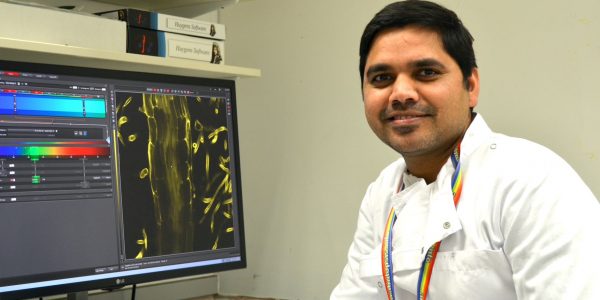
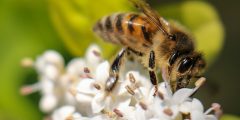

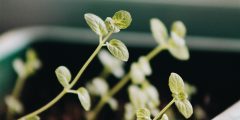
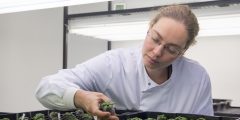

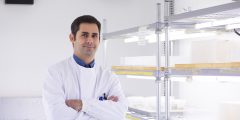



Recent Comments